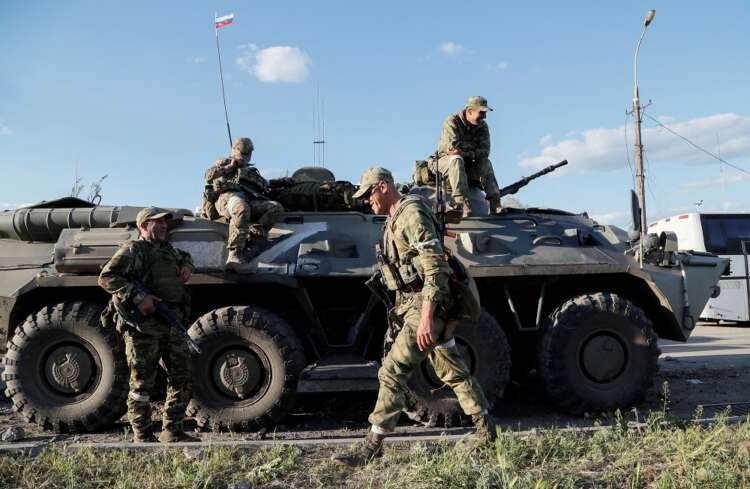Money for Ukraine tops G7 agenda; inflation, food a concern


By Christian Kraemer and Leigh Thomas
KOENIGSWINTER, Germany (Reuters) -Group of Seven financial leaders are likely to agree on Thursday and Friday to help Ukraine pay its bills in coming months, but surging inflation, climate change, supply chains and the impending food crisis are also on the agenda.
Finance ministers and central bank governors of the United States, Japan, Canada, Britain, Germany, France and Italy – the G7 – are holding talks as Ukraine, invaded by Russia on Feb. 24, is struggling to fend off the attack and is running out of cash.
“We have to secure the liquidity of the Ukrainian state,” German Finance Minister Christian Lindner, whose country holds the rotating presidency of the group, told reporters on entering the talks.
“I am quite optimistic that we will be able at this G7 meeting to rise the funding which would allow Ukraine to defend itself over the next months,” he said.
“The war in Ukraine … also entails additional risks for the development of the world economy … inflation, but also the lack of recovery after the pandemic. Therefore, we will have to discuss what we can do together in our respective areas of responsibility to avoid stagflation scenarios,” Lindner said.
The Ukraine war is a game-changer for Western powers, forcing them to rethink decades-old relations with Russia not only in terms of security, but also in energy, food and global supply alliances from microchips to rare earths.
“Ukraine is overshadowing these meetings. But there are other issues that must be discussed,” a G7 official, who asked not to be named, said, adding that debt, international taxation, climate change and global health were all up for debate.
Ukraine estimates its financial needs at $5 billion a month to keep public employees’ salaries paid and the administration working despite the daily destruction wrought by Russia.
SHORT-TERM CASH, LONG-TERM REBUILDING
The short-term financing package of some $15 billion to be agreed by the G7 would cover three months of Ukraine’s needs.
The European Commission offered on Wednesday to provide up to 9 billion euros ($9.44 billion) in loans to Ukraine, financed from EU borrowing guaranteed by EU governments, to cover Kyiv’s needs until the end of June.
Japan will double its aid for Ukraine to $600 million to help it cover its near-term needs, Prime Minister Fumio Kishida told reporters on Thursday.
The EU executive also proposed to set up a fund of unspecified size of grants and loans for Ukraine, possibly jointly borrowed by the EU, to pay for its post-war reconstruction.
Some economists estimate such a project would require between 500 billion euros and 2 trillion euros ($524 billion to $2.09 trillion), with estimates frequently changing depending on the length of the conflict and the scope of destruction.
With sums of that magnitude coming into play, the EU is considering not only a new joint borrowing project, modelled on the pandemic recovery fund, but also seizing the now frozen Russian assets in the EU, as sources of financing.
Some countries like Germany, however, say that the idea, though politically interesting, would be on shaky legal grounds.
U.S. officials emphasise it is too soon to map out financing for a massive rebuilding plan for Ukraine and Washington wants the discussions to focus on Kyiv’s immediate budget needs over the next three months.
“After all, these rebuilding needs are mostly a bit in the future,” a U.S. Treasury official said. “This is why we’re focused more on the budget needs of Ukraine in the next three months than about reconstruction, Marshall Plans and asset confiscation.”
($1 = 0.9550 euro)
(Reporting by Paul Carrell, Chirstian Kraemer, Leigh Thomas, Francesco Canepa, Leika Kihara, David Lawder and Jan StrupczewskiEditing by Matthew Lewis and Tomasz Janowski)
Inflation is the rate at which the general level of prices for goods and services rises, eroding purchasing power. It indicates how much more expensive a set of goods and services has become over a certain period.
A central bank is a national institution that manages a country’s currency, money supply, and interest rates. It oversees the banking system and implements monetary policy.
Economic growth is an increase in the production of goods and services in an economy over a period, typically measured by the rise in Gross Domestic Product (GDP).
Explore more articles in the Top Stories category











